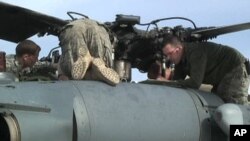Wounded NATO and U.S. troops in Afghanistan often depend on helicopter medical evacuation teams to stay alive. The medevac teams are trained to retrieve wounded troops and get them to a military hospital outside of Kabul for treatment within 60 minutes. It's called "the golden hour," and within it, the survival rate is around 95 percent.
At Bagram Air Base, U.S. Air Force crews prepare their helicopters. For the next 12 hours, the medevac teams and machines will be on call to evacuate wounded troops from anywhere in eastern Afghanistan to Bagram's military-run trauma hospital.
Lt. Col. Mark Ahrens is on the command staff of the 56th Rescue Squadron at Bagram. He says his squadron is a reassuring presence in some of the country's most dangerous regions.
"It's important for many reasons, really, to give the confidence to the ground teams -- all our American GIs as well as our coalition partners on the ground -- that if they do get injured, there's somebody to go get them, whether it's in a benign situation or in the middle of a firefight."
The airmen don't fly until they're needed. That means waiting, sometimes for hours or even days.
Staff Sergeant Derek Brock is used to the waiting. He didn't fly his first real rescue until several years into his career.
"That's the way it usually goes," said Sergeant Brock. "You never know when you're going to do it."
Still, the squadron stays busy. The Bagram hospital admits around 3,000 patients a month, many of them by air. When the call comes, the 56th's six-person crews can be airborne within minutes.
On a recent mission, the 56th flew to Jalalabad, about 100 kilometers away, to retrieve two wounded NATO personnel.
Theirs were not life-threatening injuries, so the 56th slowed down. Total time from takeoff to delivering the patients to Bagram: less than two hours.
After dropping off the patients, the choppers headed to Bagram's gunnery range to test their weapons. Unlike other medevac aircraft, Air Force helicopters are equipped to defend themselves.
That means they're expensive. Last year, citing the cost, the Pentagon canceled a $14 billion program to buy new helicopters for the rescue squadrons and switch the medical missions to less heavily armed Army helicopters.
But after further review, Pentagon officials revived the plans for the new helicopters. And the 56th Rescue Squadron is still flying and saving lives in Afghanistan.




